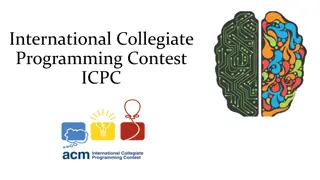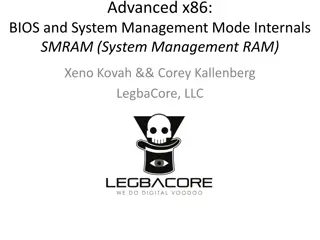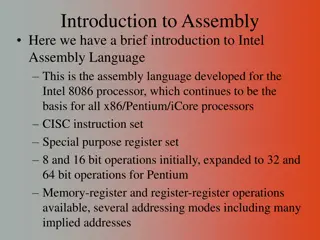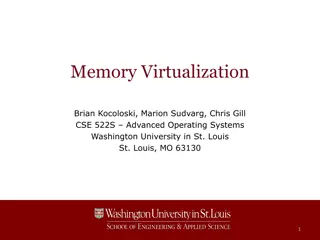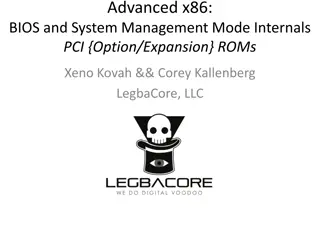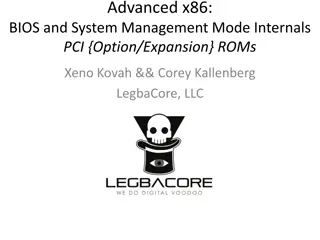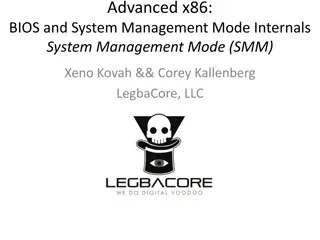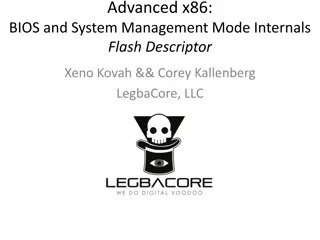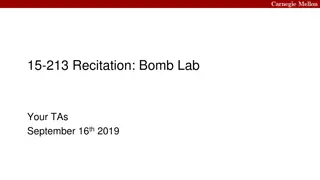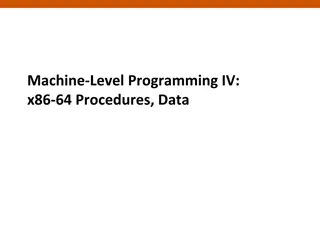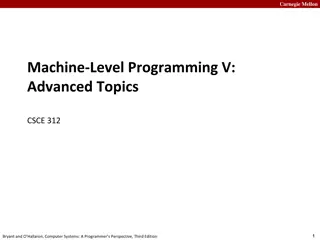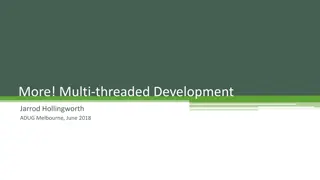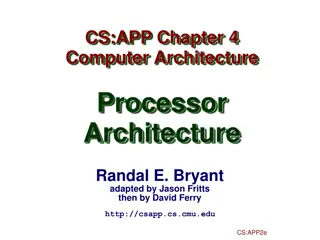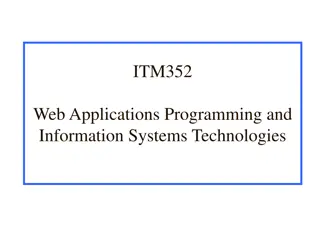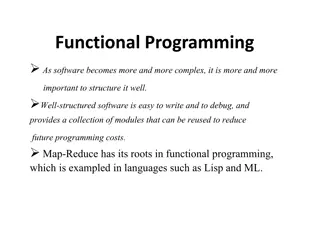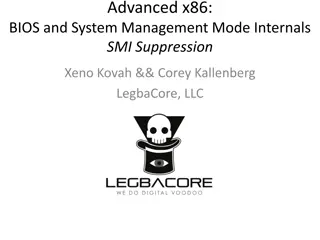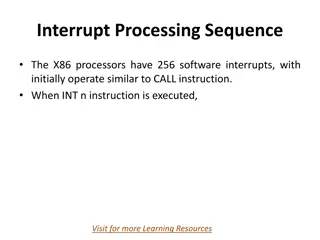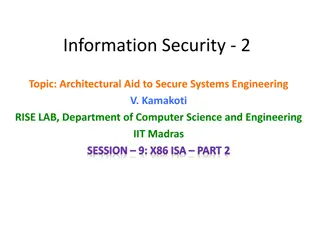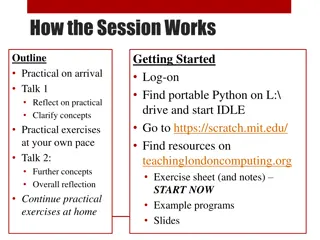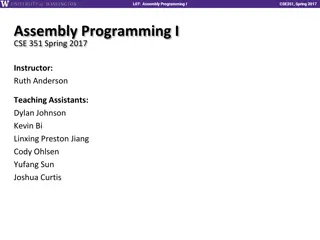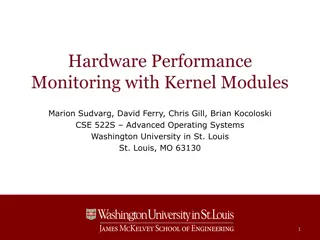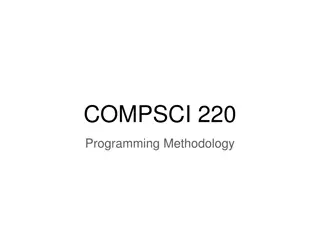Functional Programming
Functional programming, a paradigm that emphasizes declarative programming, pure functions, and limited side effects. Explore the benefits and characteristics of functional programming languages.
0 views • 20 slides
Programming in C: Overview and Constants Explanation
Programming in C is a fundamental introductory guide to the C programming language. It covers the basics of C, including its development history, character set, constants, and rules for constructing constants like integer and real constants. Dr. M. A. JAMAL MOHAMED YASEEN ZUBEIR, an Assistant Profes
3 views • 33 slides
International Collegiate Programming Contest (ICPC) Overview and Rules
The International Collegiate Programming Contest (ICPC) is a prestigious global competition in competitive programming supported by major tech companies like Google and Facebook. Participants tackle logical and mathematical problems by developing efficient algorithms and implementing them in various
5 views • 17 slides
Decision Analysis and Operations Research in Management
This content delves into Management Decision Analysis and Operations Research techniques such as Linear Programming, Integer Linear Programming, Dynamic Programming, Nonlinear Programming, and Network Programming. It covers the phases of an Operations Research study, mathematical modeling for decisi
0 views • 36 slides
Understanding System Management RAM (SMRAM) in x86 Architecture
Delve into the internals of System Management RAM (SMRAM) in x86 architecture, exploring how the processor switches to SMRAM upon entering System Management Mode (SMM). Learn about SMBASE, the base address of SMRAM, and how the address space layout is defined. Discover how SMBASE and SMRAM are essen
1 views • 43 slides
Introduction to Intel Assembly Language for x86 Processors
Intel Assembly Language is a low-level programming language designed for Intel 8086 processors and their successors. It features a CISC instruction set, special purpose registers, memory-register operations, and various addressing modes. The language employs mnemonics to represent instructions, with
2 views • 12 slides
Understanding Memory Virtualization in Operating Systems
Memory virtualization in operating systems involves mapping guest addresses to host addresses with an added level of indirection managed by the hypervisor. Virtualization extensions in x86 processors enhance efficiency by allowing safe execution of guest code in Ring 0 through supervisor mode. The a
1 views • 28 slides
Understanding PCI Expansion ROMs in x86 Systems
This content delves into the intricacies of PCI Expansion ROMs (XROMs) in x86 systems. It covers the basics of XROMs, their execution during the boot process, configuration through Expansion ROM Base Address Register, and handling in PCI and PCIe devices. The role of BIOS in initializing XROMs and t
4 views • 21 slides
Understanding PCI/PCIe Expansion ROMs in x86 Systems
Explore the internals of PCI/PCIe Expansion ROMs (XROMs) in x86 systems, examining their role as executable code located on PCI devices, handling by BIOS during boot, configuration via Expansion ROM Base Address Register, and differences on legacy versus modern systems.
4 views • 21 slides
Understanding System Management Mode (SMM) in x86 Processors
System Management Mode (SMM) is a highly privileged mode in x86 processors that provides an isolated environment for critical system operations like power management and hardware control. When the processor enters SMM, it suspends all other tasks and runs proprietary OEM code. Protecting SMM is cruc
1 views • 26 slides
Module 2: PSEA and Safe Programming Training of Trainers (ToT) by CRS HRD
This Module 2 focuses on PSEA and Safe Programming, covering key sessions on understanding safe programming, identifying protection and SEA risks, and mitigating risks. It emphasizes the importance of safe programming in increasing safety, dignity, and access, with staff playing a crucial role. Part
2 views • 19 slides
Understanding Activation Records and Stack in Assembly Programming
Explore the key concepts of activation records and the stack in assembly programming, including their roles in function calls, memory management, and variable storage. Gain insights into the low-level layout of variables, call conventions in MIPS and x86, and practical examples illustrating stack op
2 views • 66 slides
Understanding Computer Programming: Basics and Beyond
In this chapter, we delve into the fundamental concepts of computer programming. We explore the definition of a program, the role of programming languages, types of programming languages, and generations of programming languages. Additionally, an assignment is provided to reinforce the key learnings
0 views • 25 slides
Understanding Flash Descriptor in x86 Systems
Explore the internals of the Flash Descriptor in x86 systems, essential for BIOS and system management mode. Learn about SPI regions, determining SPI regions, flash protection mechanisms, and the structure of the Flash Descriptor for Intel systems. Complete with images and detailed explanations.
5 views • 30 slides
Understanding Object-Oriented Programming (OOP) in Python
Python is a versatile programming language that supports various programming approaches. Object-Oriented Programming (OOP) is a popular method in Python where objects are created to solve programming problems. OOP in Python focuses on creating reusable code, following the principle of DRY (Don't Rep
1 views • 35 slides
15-213 Recitation: Bomb Lab Overview and Tips
This content covers the Bomb Lab exercise in x86-64 assembly code and GDB debugging techniques. It explains the purpose of Bomb Lab, downloading the bomb, detonating the bomb, hints for solving phases, and x86-64 Linux register usage. The material emphasizes the importance of using GDB for efficient
1 views • 42 slides
Introduction to Computers and C++ Programming Lecture 1 - Overview and Basics
This lecture covers the fundamental concepts in computer systems and programming using C++. Topics include the main components of a computer, bytes and addresses in memory, computer systems hardware and software, understanding programs, programming languages, compilers, preparing and running C++ pro
1 views • 21 slides
Web Application Development and Programming CTE Program Overview
Viera High School offers a comprehensive CTE program in Web Application Development and Programming, taught by Mr. Dohmen. Students learn popular programming languages like Python, SQL, JavaScript, Java, C#, and C. The courses cover web programming, JavaScripting, and PHP programming, providing cert
1 views • 7 slides
Understanding x86-64 Procedures and Data Structures
This content provides insights into x86-64 programming, covering topics such as procedures, integer registers, stack frames, locals in the red zone, interesting features of stack frames, arrays, multi-dimensional structures, and more. It dives into the usage conventions of integer registers, the all
0 views • 44 slides
Understanding Memory Layout in Computer Systems at Carnegie Mellon
Explore the memory layout in computer systems through the lens of Carnegie Mellon University's advanced topics in machine-level programming. Learn about buffer overflow vulnerability protection, memory allocation examples, x86-64 Linux memory layout, and addressing schemes. Dive into practical examp
2 views • 47 slides
Introduction to Programming with RobotC in Robotics Education
Programming in robotics involves giving specific directions to a robot using software like RobotC. This introduction covers the basics of programming, software organization, and how to get started with RobotC through creating flow charts and programming tasks. Learn about setting up RobotC, creating
0 views • 8 slides
Introduction to Programming and Computer Instructions
Programming is the process of creating instructions for computers to follow and accomplish tasks. It involves turning human language instructions into detailed binary machine language. Before learning programming, individuals may have different levels of experience, ranging from no experience to pro
0 views • 16 slides
Advanced Multi-Threaded Development Overview
Explore the challenges and tips for developing multi-threaded applications in a workshop conducted by Jarrod Hollingworth in Melbourne. Learn about thread safety, Delphi Parallel Programming Library, and delve into low-level thread details. Dive into parallel programming with XE7+ and discover TPara
0 views • 15 slides
Development of Attosecond Theory for Nobel Prize through Verilog Programming
Attosecond generation is a crucial technique for creating attosecond pulses by manipulating radiation waves. This research paper focuses on developing the Attosecond generation equation through Verilog programming and validating it using test programming techniques. The interface between equations,
0 views • 15 slides
CS252 Systems Programming Course Overview
This course overview covers topics such as C programming review, Unix basics, Unix systems programming, and grading details. The course includes labs on C/C++ programming, Unix shell scripting, and writing your own shell. Communication is emphasized through Piazza for questions/answers and Blackboar
0 views • 41 slides
Introduction to Y86 Instruction Set Architecture
Y86 Instruction Set Architecture is a simplified pseudo-language based on x86 (IA-32) architecture. It involves implementing the Fetch-Decode-Execute cycle, where instructions are fetched from memory, decoded, and executed. The Y86 ISA offers a simpler set of instructions and formats compared to x86
0 views • 25 slides
Introduction to Programming Languages and Functional Programming with OCaml
Welcome to Lecture 1 of CSEP505 on Programming Languages focusing on OCaml and functional programming. Professor Dan Grossman introduces the course, discusses the importance of studying programming languages, and shares insights on course mechanics and content. Topics include staff introductions, co
0 views • 84 slides
Understanding ITM352 and Its Role in MIS
Welcome to ITM352, a course focusing on acquiring basic programming skills in a business context. This course emphasizes hands-on experience in developing relevant software applications, addressing real technology problems, and fostering rapid self-learning of IS/IT technologies. Misconceptions arou
0 views • 36 slides
Understanding Functional Programming Paradigm
Functional programming emphasizes well-structured software that is easy to write and debug, with reusable modules to reduce future programming costs. It introduces higher-order functions and first-class function values, fostering declarative programming for tasks like symbolic data manipulation and
0 views • 21 slides
Understanding SMI Suppression in x86 BIOS Management
Delve into the intricacies of SMI Suppression in x86 BIOS and System Management Mode internals, where SMI stands as a crucial defense mechanism to safeguard the BIOS flash from unauthorized modifications. Explore the impact of suppressing SMI generation and learn about the SMI_EN register's role in
1 views • 18 slides
Understanding Interrupt Processing Sequence in X86 Processors
X86 processors have 256 software interrupts, functioning similarly to a CALL instruction. When an INT n instruction is executed, the processor follows a sequence involving pushing the flag register, clearing flags, finding the correct ISR address, and transferring CPU control. Special interrupts lik
0 views • 10 slides
Understanding X86 ISA Flags in System Security
This article delves into the details of various flags in the X86 ISA architecture, such as CF (Carry Flag), PF (Parity Flag), AF (Auxiliary Flag), ZF (Zero Flag), SF (Sign Flag), TF (Trace Flag), IF (Interrupt Flag), DF (Direction Flag), OF (Overflow Flag), and IOPL (Input Output Privilege Level). T
0 views • 16 slides
Essential Principles of Teaching Programming Languages
Foundational concepts in programming form the core of computing. This encompasses understanding programming fundamentals, teaching language aspects effectively, statistical programming for data analysis, and guiding students unfamiliar with programming environments towards grasping the logic and sim
0 views • 23 slides
Exploring Computer Programming Principles
Dive into the world of computer programming, covering high-level and machine languages, compilers, interpreters, writing programs, top-down design, and the array of programming languages available. Understand the essentials of building code to control computers, the diversity of programming language
0 views • 23 slides
Transitioning from Scratch to Python: A Practical Approach for Learning Textual Programming
Explore the transition from visual programming in Scratch to textual programming in Python using Turtle Graphics. Engage in practical exercises, clarify key concepts, and reflect on the challenges and progress in learning core programming concepts. Utilize resources from TeachingLondon Computing to
0 views • 21 slides
Assembly Programming in CSE351 Spring 2017
Explore the world of assembly programming through CSE351 in Spring 2017. Delve into topics like memory, data, x86 assembly, procedures, executables, arrays, and more. Learn about the differences in Java and C, machine code, hardware, compilers, and the factors that influence program performance. Und
0 views • 24 slides
Understanding x86-64 Stack and Register Usage at Carnegie Mellon
Explore the concepts of stack management, function invocation, and register usage in x86-64 architecture as taught in Carnegie Mellon's 15-213 recitation on Attack Lab. Learn about stack operations, caller vs. callee functions, and the conventions for using registers effectively. Gain insights into
0 views • 26 slides
CS 288-102 Intensive Programming in Linux Spring 2017 Course Details
Learn Linux programming, C language proficiency, Bash scripting, and more in this intensive course taught by Instructor C.F. Yurkoski. The course covers programming in Linux environment, command line interface, C language, client/server programming, and essential programming concepts like pointers,
0 views • 31 slides
Hardware Performance Monitoring with Kernel Modules
This document explores the use of hardware performance counters and cycle counting on x86 and ARM architectures for monitoring and analyzing system performance. It covers topics such as the utilization of hardware counters, cycle counting on x86 processors, and the ARM Performance Monitor Unit (PMU)
0 views • 12 slides
Functional Programming Concepts for COMPSCI 220 Programming Methodology
In this tutorial, we explore functional programming concepts in the context of COMPSCI 220 Programming Methodology. We delve into writing functions using `reduce` and discuss examples and implementations of various functions like sum, product, and string length calculation. We also analyze the diffe
1 views • 47 slides


